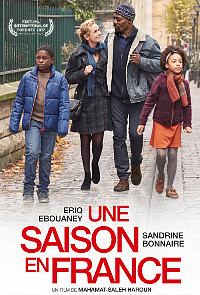| SHADOWS ON THE WALL | REVIEWS | NEWS | FESTIVAL | AWARDS | Q&A | ABOUT | TALKBACK | |||||||||||||
 Shadows off the beaten path Shadows off the beaten pathIndies, foreigns, docs, revivals and shorts...
On this page:
AMIN |
CANARY |
A SEASON IN FRANCE
| |||||||||||||
| See also: SHADOWS FILM FESTIVAL | Last update 18.Jun.19 | |||||||||||||
|
Amin Review by Rich Cline | 
| |||||||||||||
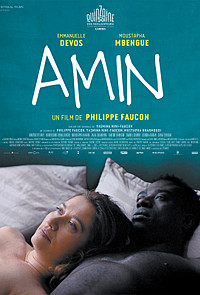 dir Philippe Faucon prd Philippe Faucon, Yasmina Nini-Faucon scr Philippe Faucon, Yasmina Nini-Faucon, Mustapha Kharmoudi with Moustapha Mbengue, Emmanuelle Devos, Mareme N'Diaye, Noureddine Benallouche, Moustapha Naham, Jalal Quarriwa, Fantine Harduin, Samuel Churin, Modou Ngom, Alioune Sow, Mariama Sene, Aida Lo release Fr 3.Oct.18, UK 21.Jun.19, US 4.Dec.20 18/France 1h31 |
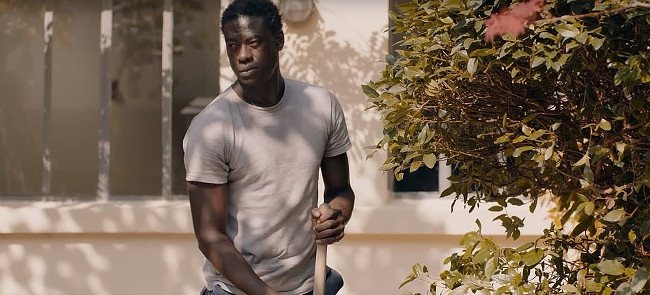 Warm and earthy rather than provocative, this French drama quietly explores the life of migrant workers who travel from Africa to Europe to help their families and communities back home. Filmmaker Philippe Faucon kind of skims the surface, watching rather than investing in the drama. But the stories he tells are important, and the filmmaking is engagingly thoughtful. To support his family, Amin (Mbengue) migrated from Senegal to France nine years ago to become a construction worker. But as his three children get older, his wife Ayesha (N'Diaye) thinks he should be home more often than the occasional holiday. Tired of living with Amin's prickly mother, she wants them all to move to France, which isn't possible. Back in France, Amin's life in the workers' hostel is rather grim, only livened up by friendships with his colleagues. Then Amin begins a relationship with Gabrielle (Devos), a divorcee whose teen daughter (Harduin) seriously disapproves. Deliberately including a wide range of experiences around the issue, the script subtly widens out to explore other men and women separated from their families due to economic migration. The pressures on all of these people are huge, as are the expectations they have for a life free of such desperate circumstances. For example, Amin's family saved up to send him to France, so they want Ayesha to stop complaining to him. They also want to control how she acts. Performances are understated and natural, giving the film a documentary tone. Mbengue has a soft-spoken intensity that's magnetic. Stoic and aloof, he's more complex in scenes with his family back home, most notably opposite Sow as his teen son. It's clear that the years have left him feeling out of sync with his wife, whom N'Diaye brings to life as an intelligent, feisty woman who's a formidable force all her own. By contrast, Amin's connection with Devos' softly needy Gabrielle is nice but never sexy. Amin's migrant friends are played in ways that feel raw and very real. Ousmane (Naham) supports a large family back home, while Abdelaziz (Benallouche) is split between his wife in Morocco and his daughters in France. Some of the story strands feel a little obvious, as if Faucon wanted to be sure to cover each base (contrasting conflicts, prejudices, bullying, tragedy). But even if it feels a bit all-encompassing, it also feels powerfully honest, allowing the themes to gurgle realistically without ever pushing them.
| ||||||||||||
|
Canary Kanarie Review by Rich Cline |  MUST
MUST  SEE SEE
| |||||||||||||
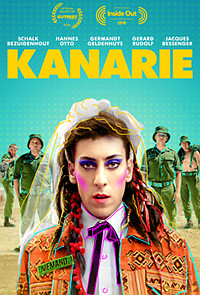 dir Christiaan Olwagen prd Jaco Smit scr Charl-Johan Lingenfelder, Christiaan Olwagen with Schalk Bezuidenhout, Hannes Otto, Germandt Geldenhuys, Gerard Rudolf, Jacques Bessenger, Francois Jacobs, De Klerk Oelofse, Ludwig Binge, David Viviers, Andrico Goosen, Beer Adriaanse, Laudo Liebenberg release SA 19.Oct.18, US 18.Jun.19 18/South Africa 2h04 |
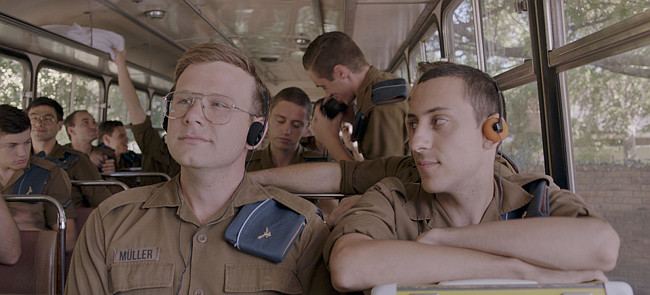 South African filmmaker Christiaan Olwagen uses both gritty realism and heightened musicality to tell this story of a young man who has learned to suppress his colourful personality and sexual identity. Skilfully shot and acted, the film is packed with sharp observations both of the political situation of the time and the personal issues the characters are grappling with. It's a provocative, involving journey to self-acceptance. In fiercely religious Afrikaans society in 1984, colourful rural teen Johan (Bezuidenhout) is a Canary, working as a musician during mandatory military service. Trying to lay low in boot camp, Johan is wary about talkative fellow Canaries like Wolfgang and Ludolf (Otto and Geldenhuys), even as he bonds with them. As the choir tours the country, Johan finds that he has more in common with his colleagues than he thought. And along the road, the boys begin to understand their place in a country that's filled with conflict. The film opens with a big dance routine to Bronski Beat's iconic Smalltown Boy, and there are continual references to 1980s hits, as Johan keeps a photo of Boy George in his Bible and the choir heads to a neon nightclub on a weekend pass. Olwagen's direction cleverly dips into Johan's imagination, revealing his thoughts, fears and yearnings. Johan wants to study fashion design, instead of being the doctor or teacher as planned. He also longs for a role model who will make him feel normal. The cast is hugely engaging, offering earthy, naturalistic performances. Bezuidenhout is particularly strong, a farmboy aware that everyone underestimates him, although he needs to learn that he's his own worst enemy. When Johan and Otto's Wolfgang cross that unspoken line, the scene is beautifully staged and played, as is the shy romance that follows. Johan's struggle with his conscience is painfully honest, and when he tests it, his harshly religious upbringing is shaken to the core. There are also pointed references to Apartheid along the way, noting that trying to avoid a problem is the same as taking a side. Is what's true necessarily right? Olwagen expertly assembles the film with vivid cinematography (by Chris Vermaak) that adds visual flourishes even as it reveals internal feelings. Music is knowingly woven right through each sequence, both pop hits and choral hymns. This brings out the inner lives of these young men in a very clever way. "As soon as your cage door opens," an understanding woman advises Johan, "fly away."
| ||||||||||||
|
A Season in France Une Saison en France Review by Rich Cline | 

| 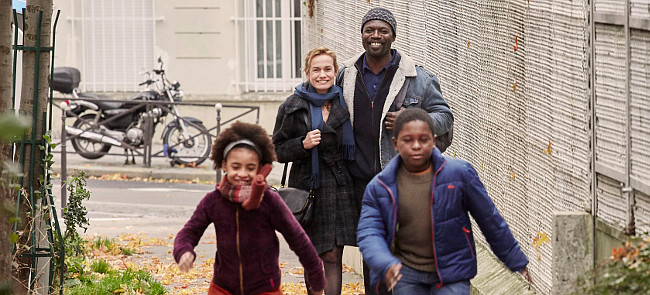 Sensitive and involving, this French drama takes a low-key approach to the pungent topic of asylum seekers. Filmmaker Mahamat-Saleh Haroun keeps the film in touch with day-to-day realism, resisting melodramatic touches as he charts a humane path through the plot. This is a quiet story that contains a minefield of sharp edges, hauntingly written and directed to highlight the issues while keeping the story personal. Starting over in France, war refugee Abbas (Ebouaney) is still badly missing his late wife (Nkake), and so are his son Yacine (Darboe) and daughter Asma (Lys). Waiting for an answer on his appeal for asylum, Abbas works a local market stall alongside his French girlfriend Carole (Bonnaire). Back in the Central African Republic, Abbas and his friend Etienne (Tanga) were schoolteachers, but just remaining here legally is a struggle. As the options for both men seem to evaporate around them, Abbas' main concern is to keep his kids from feeling his own desperation. The quietly introspective tone pulls the audience into the life of this fragile family haunted by the woman who was killed in the civil war they were escaping from. Most scenes are small events, never over-egged but underscored with realistic humour and emotion. Even the big things that happen feel eerily grounded. And through it all, there's an alarming sense of the new reality for these displaced people who once had successful, happy lives. "I'm no use to anyone," Etienne sighs to his girlfriend Martine (Simaga). Performances are introspective, letting emotions emerge in powerful waves. Ebouaney and Tanga are powerful as intelligent men whose dignity has been taken from them along with their sense of worth. Because they're educated, their words have a poetic kick that makes both them deeply engaging. Meanwhile, Darboe and Lyz add some lively energy as children who are encouraged to be kids but know what's going on. And Bonnaire provides earthy emotions to her scenes. The film cuts right through right-wing ideas of immigrants as freeloaders. The bad guys here are the invisible asylum officials who hide behind regulations and form letters, and landlords who refuse to consider personal situations. That said, there is no easy solution, since the main problem is that most people are too busy with their own issues to care for each other. In this sense, Haroun isn't naive enough to offer hope for people caught in this kind of situation. But his yearning cry for compassion is powerful.
| 
See also: SHADOWS FILM FESTIVAL © 2019 by Rich Cline, Shadows
on the Wall
HOME | REVIEWS | NEWS | FESTIVAL | AWARDS
| Q&A | ABOUT | TALKBACK | | ||||||||||


